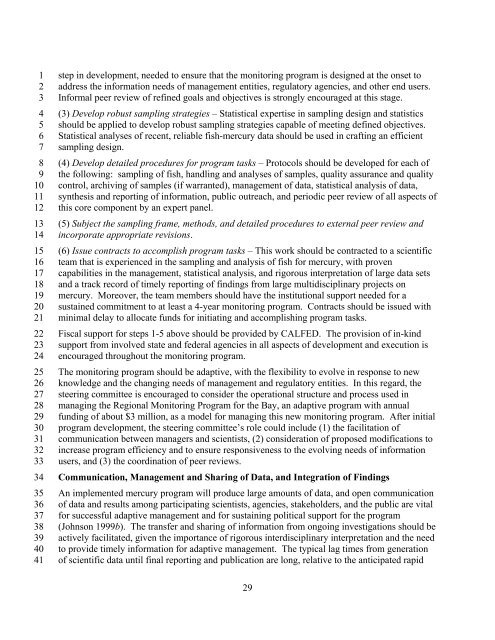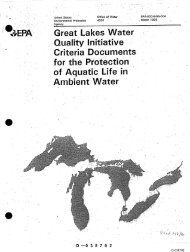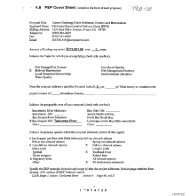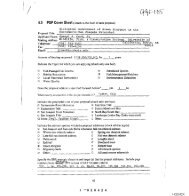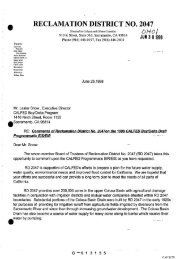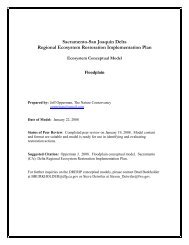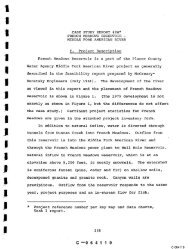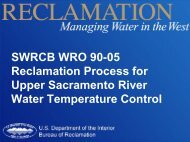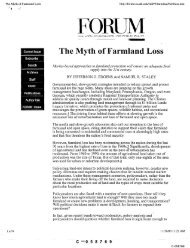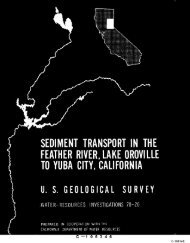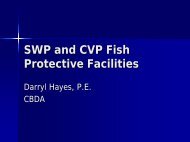Mercury Strategy for the Bay-Delta Ecosystem - CALFED Bay-Delta ...
Mercury Strategy for the Bay-Delta Ecosystem - CALFED Bay-Delta ...
Mercury Strategy for the Bay-Delta Ecosystem - CALFED Bay-Delta ...
You also want an ePaper? Increase the reach of your titles
YUMPU automatically turns print PDFs into web optimized ePapers that Google loves.
1<br />
2<br />
3<br />
4<br />
5<br />
6<br />
7<br />
8<br />
9<br />
10<br />
11<br />
12<br />
13<br />
14<br />
15<br />
16<br />
17<br />
18<br />
19<br />
20<br />
21<br />
22<br />
23<br />
24<br />
25<br />
26<br />
27<br />
28<br />
29<br />
30<br />
31<br />
32<br />
33<br />
34<br />
35<br />
36<br />
37<br />
38<br />
39<br />
40<br />
41<br />
step in development, needed to ensure that <strong>the</strong> monitoring program is designed at <strong>the</strong> onset to<br />
address <strong>the</strong> in<strong>for</strong>mation needs of management entities, regulatory agencies, and o<strong>the</strong>r end users.<br />
In<strong>for</strong>mal peer review of refined goals and objectives is strongly encouraged at this stage.<br />
(3) Develop robust sampling strategies – Statistical expertise in sampling design and statistics<br />
should be applied to develop robust sampling strategies capable of meeting defined objectives.<br />
Statistical analyses of recent, reliable fish-mercury data should be used in crafting an efficient<br />
sampling design.<br />
(4) Develop detailed procedures <strong>for</strong> program tasks – Protocols should be developed <strong>for</strong> each of<br />
<strong>the</strong> following: sampling of fish, handling and analyses of samples, quality assurance and quality<br />
control, archiving of samples (if warranted), management of data, statistical analysis of data,<br />
syn<strong>the</strong>sis and reporting of in<strong>for</strong>mation, public outreach, and periodic peer review of all aspects of<br />
this core component by an expert panel.<br />
(5) Subject <strong>the</strong> sampling frame, methods, and detailed procedures to external peer review and<br />
incorporate appropriate revisions.<br />
(6) Issue contracts to accomplish program tasks – This work should be contracted to a scientific<br />
team that is experienced in <strong>the</strong> sampling and analysis of fish <strong>for</strong> mercury, with proven<br />
capabilities in <strong>the</strong> management, statistical analysis, and rigorous interpretation of large data sets<br />
and a track record of timely reporting of findings from large multidisciplinary projects on<br />
mercury. Moreover, <strong>the</strong> team members should have <strong>the</strong> institutional support needed <strong>for</strong> a<br />
sustained commitment to at least a 4-year monitoring program. Contracts should be issued with<br />
minimal delay to allocate funds <strong>for</strong> initiating and accomplishing program tasks.<br />
Fiscal support <strong>for</strong> steps 1-5 above should be provided by <strong>CALFED</strong>. The provision of in-kind<br />
support from involved state and federal agencies in all aspects of development and execution is<br />
encouraged throughout <strong>the</strong> monitoring program.<br />
The monitoring program should be adaptive, with <strong>the</strong> flexibility to evolve in response to new<br />
knowledge and <strong>the</strong> changing needs of management and regulatory entities. In this regard, <strong>the</strong><br />
steering committee is encouraged to consider <strong>the</strong> operational structure and process used in<br />
managing <strong>the</strong> Regional Monitoring Program <strong>for</strong> <strong>the</strong> <strong>Bay</strong>, an adaptive program with annual<br />
funding of about $3 million, as a model <strong>for</strong> managing this new monitoring program. After initial<br />
program development, <strong>the</strong> steering committee’s role could include (1) <strong>the</strong> facilitation of<br />
communication between managers and scientists, (2) consideration of proposed modifications to<br />
increase program efficiency and to ensure responsiveness to <strong>the</strong> evolving needs of in<strong>for</strong>mation<br />
users, and (3) <strong>the</strong> coordination of peer reviews.<br />
Communication, Management and Sharing of Data, and Integration of Findings<br />
An implemented mercury program will produce large amounts of data, and open communication<br />
of data and results among participating scientists, agencies, stakeholders, and <strong>the</strong> public are vital<br />
<strong>for</strong> successful adaptive management and <strong>for</strong> sustaining political support <strong>for</strong> <strong>the</strong> program<br />
(Johnson 1999b). The transfer and sharing of in<strong>for</strong>mation from ongoing investigations should be<br />
actively facilitated, given <strong>the</strong> importance of rigorous interdisciplinary interpretation and <strong>the</strong> need<br />
to provide timely in<strong>for</strong>mation <strong>for</strong> adaptive management. The typical lag times from generation<br />
of scientific data until final reporting and publication are long, relative to <strong>the</strong> anticipated rapid<br />
29


